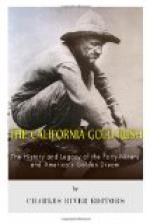The time was psychologically right. Occasionally a contagion of religious need seems to sweep the country. People demand manifestations and signs, and will flock to any who can promise them. To this class the Book of Mormon, with its definite sort of mysticism, appealed strongly. The promises of a new Zion were concrete; the power was centralized, so that people who had heretofore been floundering in doubt felt they could lean on authority, and shake off the personal responsibility that had weighed them down. The Mormon communities grew fast, and soon began to send out proselyting missionaries. England was especially a fruitful field for these missionaries. The great manufacturing towns were then at their worst, containing people desperately ignorant, superstitious, and so deeply poverty-stricken that the mere idea of owning land of their own seemed to them the height of affluence. Three years after the arrival of the missionaries the general conference reported 4019 converts in England alone. These were good material in the hands of strong, fanatical, or unscrupulous leaders. They were religious enthusiasts, of course, who believed they were coming to a real city of Zion. Most of them were in debt to the Church for the price of their passage, and their expenses. They were dutiful in their acceptance of miracles, signs, and revelations. The more intelligent among them realized that, having come so far and invested in the enterprise their all, it was essential that they accept wholly the discipline and authority of the Church.
Before their final migration to Utah, the Mormons made three ill-fated attempts to found the city of Zion, first in Ohio, then in western Missouri, and finally, upon their expulsion from Missouri, at Nauvoo in Illinois. In every case they both inspired and encountered opposition and sometimes persecution. As the Mormons increased in power, they became more self-sufficient and arrogant. They at first presumed to dictate politically, and then actually began to consider themselves a separate political entity. One of their earliest pieces of legislation, under the act incorporating the city of Nauvoo, was an ordinance to protect the inhabitants of the Mormon communities from all outside legal processes. No writ for the arrest of any Mormon inhabitants of any Mormon city could be executed until it had received the mayor’s approval. By way of a mild and adequate penalty, anyone violating this ordinance was to be imprisoned for life with no power of pardon in the governor without the mayor’s consent.
Of course this was a welcome opportunity for the lawless and desperate characters of the surrounding country. They became Mormon to a man. Under the shield of Mormon protection they could steal and raid to their heart’s content. Land speculators also came into the Church, and bought land in the expectation that New Zion property would largely rise. Banking grew somewhat frantic. Complaints became so bitter




